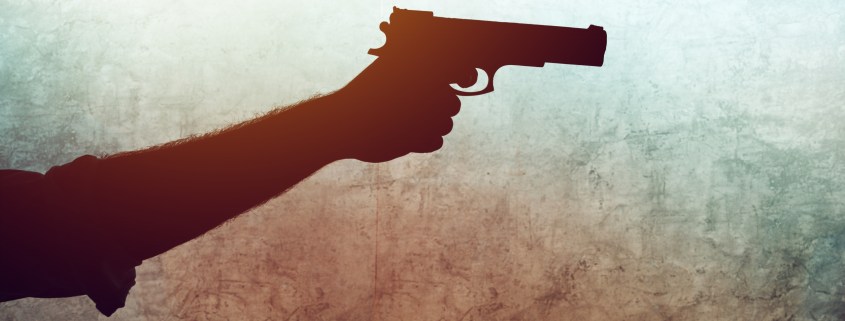A recent editorial cartoon of Philadelphia District Attorney Larry Krasner has the heading “Crime under the ‘Watchful’ eye of Larry Krasner” and shows him blaming crime, COVID, the court system, police and the Philadelphia Flyers defense for the rise in crime, while a sign at the front of his desk reads “The Buck Stops Anywhere But Here.” The cartoon reflected a recent Philadelphia Inquirer report on the rise of arrests of persons carrying illegally purchased guns and yet a decrease in convictions by the DA’s office of those arrests. Summarizing the issue the article said: “Thousands more people are being arrested for carrying guns illegally. But their chances of being convicted in court have fallen by nearly a quarter.”
The conventional wisdom is that the way to stop violent crime is to confiscate and convict those who carry illegal guns, thereby preventing them from using those guns in a future crime. That logic makes sense as far as it goes…. but it doesn’t go far enough. It does not ask the question: Why are these people, mostly young men of color, carrying the guns in the first place? What are the conditions in their homes, their neighborhoods, in the city at large that make people feel less safe and less secure, and thereby need to arm themselves?
Several years ago I wrote a series of reports on gun violence for the Mennonite Central Committee. The report was part of a packet of materials made available to churches wanting to educate themselves about the problems of gun violence. In that study I looked at the culture of gun owners as presented by the website of the National Rifle Association (NRA) and studies of the culture of urban youth gangs involved in gun violence. What I found was that both groups had a similar perspective on the use of guns. Both wanted to protect their families and defend themselves against unwanted intrusions into their lives. Guns gave them a sense of power and control against a seemingly uncontrollable and often dangerous world. Their rationale was one of defensiveness and protection and not a desire to inflict pain on others.
So while the manner in which guns are secured may be outside the law, the reasons for carrying them are very similar to those who advocate for 2nd Amendment rights. Back in 2009 I was part of a group called Heeding God’s Call that called attention to the illegal gun trade coming out of a well-known gun shop in Philadelphia. We were arrested for blocking the entrance to the store because the store also happened to be a major source of firearms for the Philadelphia Police department. The officers arresting us would not listen to the evidence we had gathered about the store’s illegal activities. So in that case, the police were protecting the very source of many guns on the street. We were later acquitted (with Larry Krasner as our defense lawyer) and the shop closed down, but 12 years later the flow of illegal guns on the streets continues.
Why? Because the root of the problem is not that urban young adults are inherently violent; it is because by and large, they are scared, traumatized and trying to survive. What appears to be random violence has its roots in a culture of poverty, and a lack of access to the basic necessities of life. In the Inquirer article Krasner is cited as saying “in the midst of a contested reelection race, said the city’s focus instead should be on other issues — the long-standing structural problems that drive people toward picking up a gun, such as underfunded schools, government neglect of impoverished neighborhoods, and a bloated justice system that has targeted poor and Black and brown residents.”
Krasner is right but his answer doesn’t lend itself to quick fixes like arresting and convicting every person who has an illegal gun. Certainly, the guns need to be taken away, but then the life situation of the person detained needs to be addressed. As is all too well known, the criminal justice system does more to prepare and harden persons for a life of crime than help transform them. What is needed a restorative justice approach that asks such questions as …
- What are the circumstances that make you feel like you need to carry a gun?
- What harm has been done to you that makes you want to hurt others?
- What ongoing trauma are you and your family facing amidst the pandemic, poverty and an increasing economic downturn?
- What happened to you in school? What training or education do you need?
- What needs to happen to make you feel safe and successful?
Counting the number of people arrested carrying illegal guns makes for a clean clear graph, but does nothing to get to the heart of the problem behind the rise in gun violence. Once we stop looking at the perpetrators and victims of gun violence as subhuman and more as people with deep unmet needs, we can grapple with underlying causes of violence that will persist if all that police do is confiscate and arrest.


Thank you Drick, are you sending this to the Inquirer? That cartoon was a shame.
You are right that it’s hard to give a good sound bit, and Mr. Krasner’s quote made him sound like he’s trying to shirk responsibility. But he really is trying to get to the root of the problem. It’s going to take time. and a big comprehensive effort.
Thanks for taking it on.
Thanks, David. The focus on guns alone is short-sighted. It is one of the reasons I had to distance mysyelf from HGC and Brian Miller. We’ve had a few conversations about it, but have had to agree to disagree